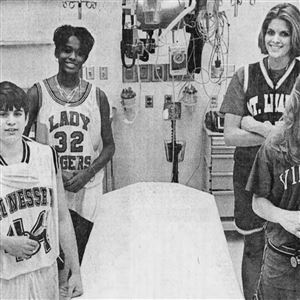Alex Hershaft left Warsaw’s ghetto long ago, but the stench of a slaughterhouse in Indiana sent him back to the Holocaust.
As the Holocaust survivor walked among piles of discarded animal parts — hearts, hooves, hides — he thought of Auschwitz and its heaps of shoes and glasses, which the German guards had stripped from doomed Jewish prisoners.
“The more I thought about it, the more I saw the parallels,” said Mr. Hershaft, now 80. “The efficiency of slaughter, the indifference of the perpetrators — like it was something totally normal.”
Thus began Mr. Hershaft’s decadeslong crusade on behalf of livestock and farm animals, a mission that brings him tonight to Pittsburgh. (Attendees can buy tickets here.)
He’ll speak about his journey at 7 p.m. at Rodef Shalom Congregation in Shadyside, a guest of the Jewish Vegetarians of North America and the Holocaust Center of Greater Pittsburgh.
“As far as we can tell, no officially accredited Holocaust center has ever done a program on this issue,” said Jeffrey Cohan, executive director of Jewish Vegetarians of North America. “This is the most extensive lecture he has ever given where he elaborates on how his ordeal in the Holocaust motivated him to do what he does.”
Born in 1934 in Poland, Mr. Hershaft grew up during Adolf Hitler’s rise to power.
Nazis pushed his family and thousands of others into the infamous Warsaw Ghetto, where his father was later killed.
Mr. Hershaft escaped shortly before the ghetto’s destruction, hiding out in Poland and spending five years in a refugee camp before coming to the United States to study.
Survivor’s guilt hit him hard.
For years, he struggled to find his niche, briefly campaigning against religious conservatism in Israel and joining the environmental movement in the United States.
Meanwhile, he received degrees from the University of Connecticut and Iowa State University, building a career in science, but it was the visit to the slaughterhouse that stuck.
Mr. Hershaft subsequently founded the Farm Animal Reform Movement, or FARM, in 1981 and was the host of a national conference on animal rights in Allentown, Pa.
While the advocates of the day concentrated more on animals undergoing scientific experimentation, FARM was among the first to focus on livestock and factory farming, an issue that has since hit the mainstream.
Mr. Hershaft has been a vegetarian for more than 50 years and a vegan for more than 30. Every morning, he drinks a frozen fruit smoothie at FARM’s office in his home in Bethesda, Md.; that usually lasts him until dinner, when he eats a salad or a soup.
His argument in favor of veganism is similarly spare: It’s good for animals, and it’s good for you.
“What we’re talking about is our obligation toward animals, not [to] oppress them and to use them for our personal gain,” Mr. Hershaft said. “Instead of getting into this complex philosophical argument [that] really sails over the heads of most people, we’re just telling them how good it is for their own health and of their own self-esteem to reduce the consumption of animals.”
First Published: August 24, 2014, 6:10 p.m.
Updated: August 25, 2014, 1:43 a.m.
















